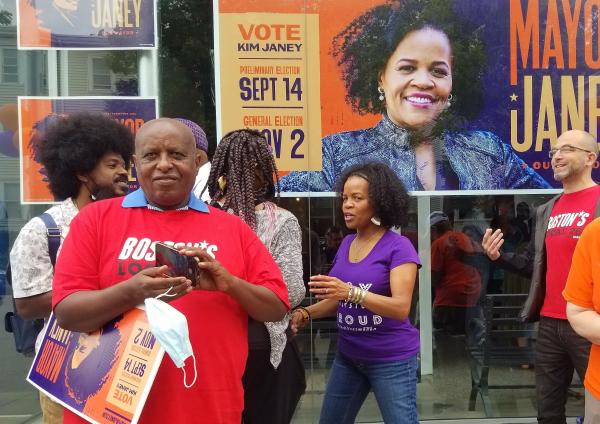July 18, 2021

Members of UNITE HERE Local 26, which endorsed Acting Mayor Kim Janey and has a super PAC supporting her, attended the Janey campaign's opening of its Jamaica Plain office. (Photo: Gintautas Dumcius)
The super PAC backing Acting Mayor Kim Janey is swinging into action, pulling in nearly half a million dollars while focusing on canvassing efforts.
The super PAC, supported by the hospitality workers union known as UNITE HERE Local 26, received $420,000 in donations from New York affiliates, according to a recent campaign finance filing. The outside group has spent some of that money on pro-Janey flyers while deploying canvassers.
The other super PAC in the race, going by the name “Better Boston,” is supporting Andrea Campbell, the District 4 councillor.
Super PACs, typically deployed by wealthy donors and unions, can raise unlimited amounts of money but cannot coordinate their moves with the campaigns they support.
Compared with the 2013 mayoral race, which saw some candidates attempt to curb outside spending, the outcry this time around is far more muted among the contenders.
Janey has decried super PACs and their outside money, but in recent comments to the Reporter, she sought to make a distinction between the one aligned with the union and the other backing one of her four rivals.
The pro-Campbell “Better Boston” super PAC hit the airwaves in June, spending hundreds of thousands of dollars on a TV ad promoting Campbell, who represents Dorchester and Mattapan on the City Council and worked as a former deputy legal counsel to Gov. Deval Patrick.
The super PAC has pulled in donations from Nonnie Burnes, a former Superior Court judge who served as head of the state Division of Insurance under Patrick; Donna Gittens, who owns a local media and marketing firm; Analog Devices founder Ray Stata; former Democratic candidate for governor Chris Gabrieli; and former Massachusetts GOP chair Jennifer Nassour.
The super PAC also has on its donor rolls a number of supporters with ties to backers of charter schools, who teachers unions say are a threat to public education as they divert funding from school districts. Supporters of charter schools say they are independently-run public schools that offer parents more choice.
In a late June email to supporters as the “Better Boston” ramped up, Janey’s campaign said super PACs are “trying to use their unlimited spending power to buy this election.”
“While my opponents count on super PACs to win, I count on grassroots supporters (like you, friend!),” the Janey campaign said in asking for small dollar donations.
Asked after a mayoral forum whether she would ask the union-backed super PAC supporting her to stand down, Janey said, “Here’s what I would say to that: I am very grateful to have the support of workers, particularly in the hotel industry who have been devastated by this pandemic. Most of whom are poor, most of whom are immigrants, most of whom are women.”
Janey, who worked as an education activist before her election to the City Council in 2017, added: “They are doing important work. I’ve been proud to stand with them, I’ve been proud to have their support. What I am standing up against are money and organizations who are trying to privatize our schools. Our schools need to be public schools for all children and I do not want to see the privatization of our schools gaining ground through super PACs supporting candidates.”
The "Better Boston" super PAC did not respond to a request for comment.
For her part, Campbell, when asked about the super PAC, said, “I’m focused on my campaign raising the resources we need to be successful.” The answer mirrored a campaign statement when the super PAC first formed back in March.
Super PACs supporting the other candidates may emerge as the September preliminary, which will narrow the field to two, gets closer.
A third super PAC, with possible ties to City Councillor At-Large Michelle Wu, has filed paperwork with state campaign finance regulators but remains publicly inactive. Wu’s campaign declined to comment.
The campaign of John Barros, a former city official, also declined to comment.
Nicole Caravella, a spokesperson for City Councillor At-Large Annissa Essaibi George’s campaign, said, “Over the next few weeks, Annissa will be focused on meeting and speaking with as many Boston residents as possible, because come September 14th, that is the support that matters most."
Even if candidates called on the super PACs to stand down, it’s something that’s easier said than done.
When super PACs crashed into the last open Boston mayoral race in 2013, City Councillor At-Large John Connolly, a former teacher who made education a top focus of his campaign, said he didn’t want outside groups spending money on his behalf as he faced off against Marty Walsh and ten others in the 2013 mayoral preliminary.
But after pro-Walsh super PACs — later revealed to be tied to unions — pumped millions of dollars into TV ads and mailers, the Massachusetts branch of Democrats for Education Reform decided to ignore Connolly’s request and plunged its own money into the final face-off between the two.
“With just 25 days until the election and over one million dollars already spent by other groups, we feel compelled to directly tell voters the value of John Connolly’s experience,” the group said.
Walsh, who rejected a pledge to curb outside spending in the race as other rivals criticized its presence, would go on to win the November election with 52 percent to Connolly’s 48 percent.
Topics:



